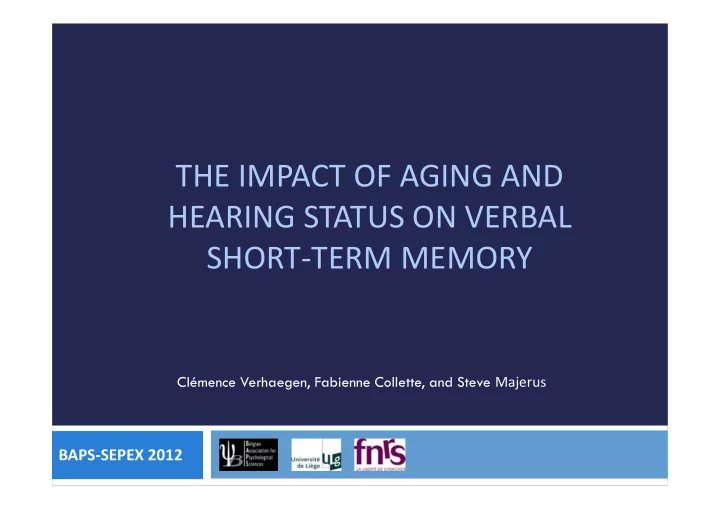

THE IMPACT OF AGING AND HEARING STATUS ON VERBAL SHORT-TERM MEMORY ������������������������������������������������� Majerus BAPS-SEPEX 2012
INTRODUCTION
� Cognitive decline in older adults � Short-term memory (e.g., Maylor, 1999) � Decrease in hearing acuity ����������� ��� ������� ����
� Surprenant (2007): � Adults > 70 years � 1/3 : clinically significant hearing loss � Almost 100% : mild hearing loss � Standard STM tasks: � span tasks � items presented auditorily
� Baltes and Lindenberger (1997); Lindenberger and Baltes (1994): � Cognitive functioning Sensory functioning (vision and hearing) � Especially old age ���������� ����������� � ������� ����� ������������ ���������� �����������
������� ��� ���������� Rabbit (1991) : old participants with a mild hearing loss recalled fewer words than old participants with a good hearing How could hearing impairment interfere with STM capacities? � The effortfulness hypothesis (Rabbit 1968; 1991) Attentional resources ��������� �������� ����������
Hypotheses ������� ������ STM ? ����� � Older participants with a hearing loss � Young participants with a hearing loss, matched for hearing thresholds � Young participants with no hearing loss
METHODS
Participants �������� �������� �������������� ������� ������� �������� ������������� � � � ����!�����" �!"#$ $"%& 18-30 #������!�$%" '�$ &'�� &'�� ������� ��������� !�&��'" %(�)�*)(� + �%()$�*&(#,+ �!(% �*&(& + $(%%�*$($-+ $(%%�*$($!+ $(! �*$($-+ �������������(�� ����������!�����������" )����������������!��"* #-&( ,�*!$(�!+ #-!(,%�* )(�,+ ,%&(,�$�*��$(-,+
Participants � Matched for academic background : ≥ 12 years of schooling � Native French speakers � Corrected or normal vision � No hearing aid � No � dementia (Mattis Scale > 130/144) � neurological, neuropschological, psychiatric disorders � medication use
Materials: � STM memory tasks Immediate serial recall of high frequency words � Immediate serial recall of similar and dissimilar words � Serial order reconstruction task � � Online phonological processing � Speeded nonword repetition task
Materials: Immediate Serial Recall (ISR) � ISR of high frequency words (Majerus, 2006) High frequency CVC words (Content, Mousty, & Radeau, 1990) � Lists with increasing length (1 to 6 items) � . ������������������� / . ������������������� / � % words correctly recalled in their order of presentation Phonological processing Words not known in advance � Open pool � New on every trial �
Materials: Immediate Serial Recall � ISR of similar and dissimilar words (Majerus, 2005) 8 similar and 8 dissimilar words of moderate frequency (Content et al., 1990) � Matched for imageability � Lists with increasing length (2 to 8 items) � Similar words: differed only by the onset phoneme (e.g., b ois- r oi) � . �������������� / . �������������� / � % words correctly recalled in their order of presentation Similar condition : Phonological processing : almost identical words
Materials: serial order reconstruction Serial order reconstruction task (Majerus, 2005) Digits from 1 to 9 � Lists with increasing length (3 to 9) � . , «2,1,4,3 � - , + . - + � % digits correctly replaced in their order of presentation Focused on the order of the items presented Phonological processing Highly familiar stimuli � Known in advance � Provided at recall (cards representing digits were given) �
Materials: phonological processing � Speeded nonword repetition task � Impaired performance in STM � items mispercieved? � Online phonological processing of auditory items � Minimal STM load � Nonwords presented in isolation � Task = recall the nonwords � CVC – low phonotactic frequency (Tubach & Boë, 1990)
RESULTS
ISR of high frequency words // F (2,45)=5.60, p <.01, =.19
ISR of phonologically similar and dissimilar words Dissimilar condition Similar condition 00 00 F (2,45)=6.89, p <.01, =.23 F (2,45)=7.99, p <.01, =.26
Serial order reconstruction task /// F (2,45)=7.55, p <.001; =.25
Speeded nonword repetition task F (2,45)=.48, ns (
DISCUSSION
������� ���� � Speeded nonword repetition task: items well percieved � In STM tasks, performance decreased. Why? � The effortfulness hypothesis (Rabbit 1968; 1991) Attentional resources ��������� �������� ����������
STM for serial order and STM for item information � In typical STM tasks (e.g., digit span tasks), simultaneous storage of: Item information : phonological and semantic � properties Order information: sequential order of the items � � Different mechanisms for the storage of item and order information � Experimental studies (e.g., Saint-Aubin & Poirier, 1999; Majerus et al., 2006b; Nairne & Kelly, 2004) � Neuropsychological data (e.g., Brock et al., 2004; Majerus et al. 2006a, 2007b) � Neuroimaging data (e.g., Majerus et al., 2006c, 2007a)
Majerus (2008); Majerus, Heiligenstein, Gautherot, Poncelet, and Van der Linden (2009); Majerus (2010) Lexical- Sublexical semantic phonological network network Item Item Attentional resources Capacity Limited Order Processing
Conclusions… � Auditory factor influences STM more than does aging � Auditory impairment � Attentional resources that would be otherwise available for STM
THANK YOU FOR YOUR ATTENTION
Recommend
More recommend